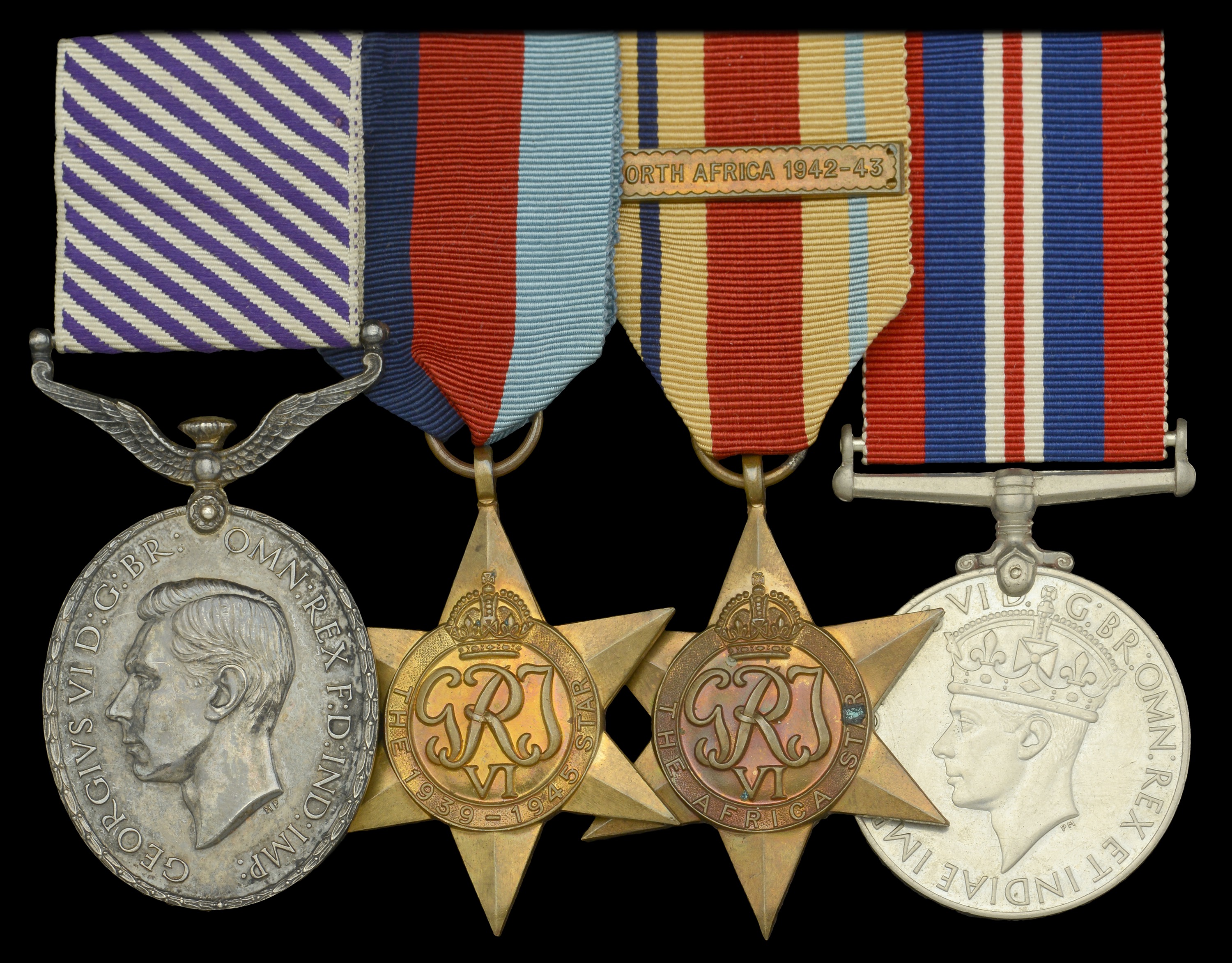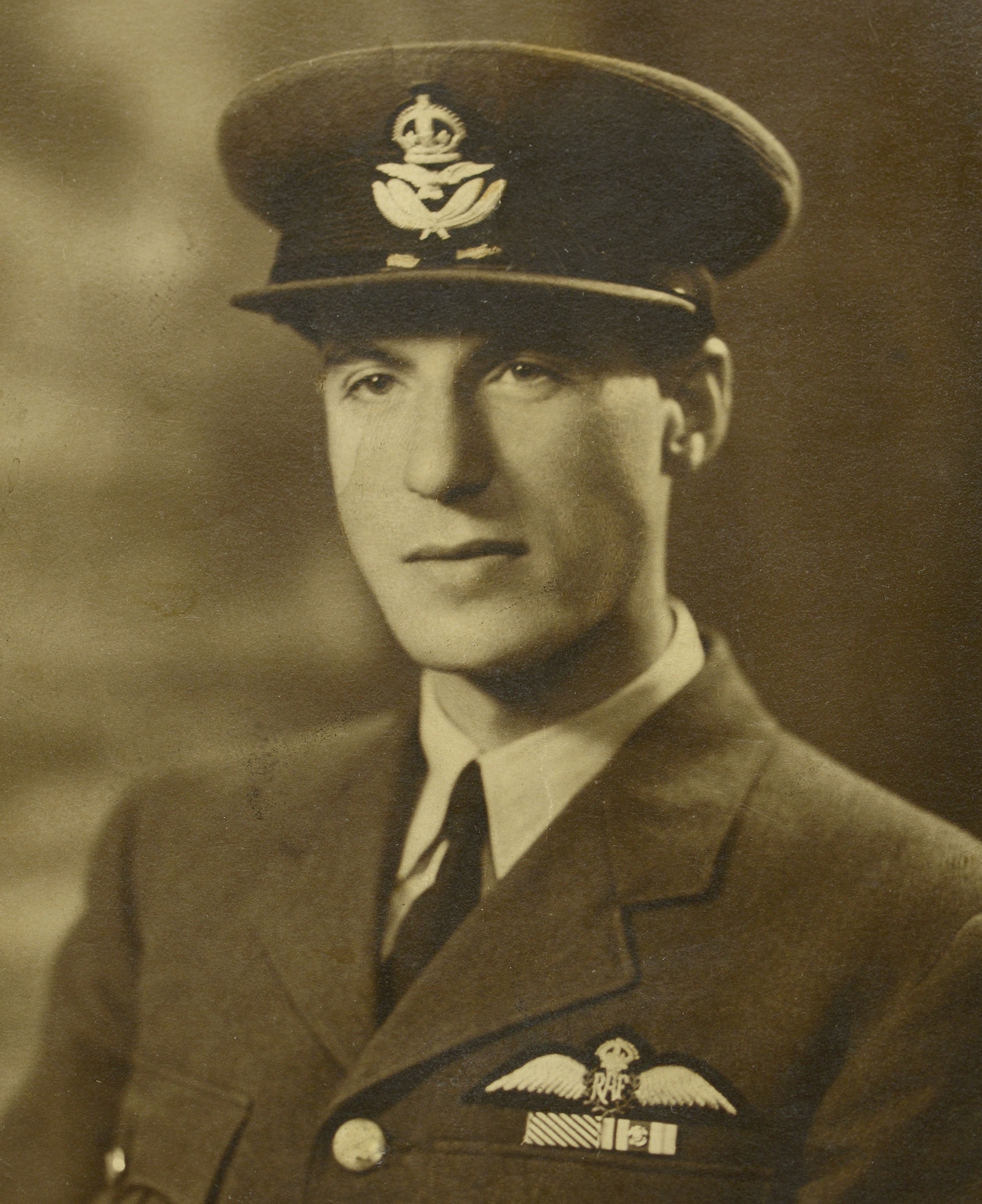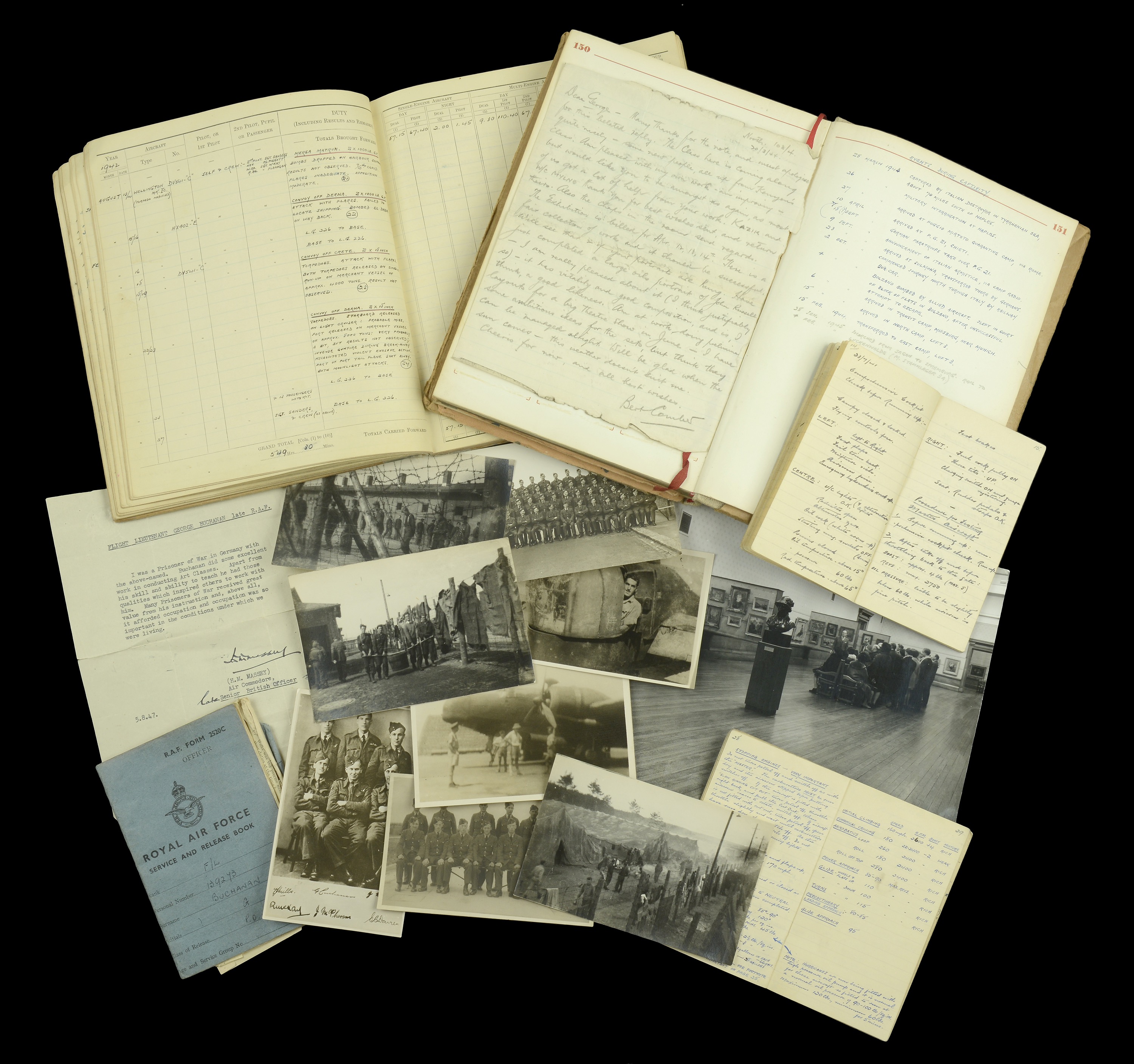102
The superb and extremely well-documented Second War 'immediate' Wellington torpedo-bomber...
Bids do not include VAT, buyer’s premium or delivery.
By confirming your bid, you agree that you have read and accepted the-saleroom.com and the auctioneer's terms and conditions. Confirming your bid is a legally binding obligation to purchase and pay for the lot should your bid be successful.
Choose one of the quick bid options below:
Bids do not include VAT, buyer’s premium or delivery.
By confirming your bid, you agree that you have read and accepted the-saleroom.com and the auctioneer's terms and conditions. Confirming your bid is a legally binding obligation to purchase and pay for the lot should your bid be successful.
Having spent 17 hours adrift in a dinghy, Buchanan and crew were eventually picked up by an Italian destroyer. He saw out the remainder of the conflict as a prisoner of war - but this was certainly not without incident. Buchanan, a talented artist, was initially interned in Italy where he started to conduct drawing classes for POW’s. He made an unsuccessful attempt to escape when being transferred from Italy to Germany, and ended up at the soon to become infamous Stalag Luft III, Sagan.
Buchanan’s talents were soon put to good use by Roger Bushell’s Escape Committee at Sagan. He was employed, along with Ley Kenyon, Colin Dilly and Bert Comber, in forging documents for the ‘Great Escape’, 24/25 March 1944. Buchanan’s escape number was ‘128’, and as such he did not manage to make it out of the camp. He avoided being among the 73 men recaptured, and amongst the 50 that were shot by the Gestapo. Buchanan did not, however, avoid been forced to take part in the ‘Long March’ from Sagan, during the freezing conditions of January 1945. After the war he put his artistic talents to a slightly more conventional use - and became the Deputy Director of Glasgow Museums and Art Galleries, Art Gallery and Museum, Kelvingrove, Glasgow
Distinguished Flying Medal, G.VI.R. (1118713 Sgt. G. Buchanan. R.A.F.) mounted on investiture pin; 1939-45 Star; Africa Star, 1 clasp, North Africa 1942-43; War Medal 1939-45, nearly extremely fine (lot) £6,000-£8,000
---
D.F.M. London Gazette 10 November 1942. The original recommendation states:
‘On the night of 8th/9th October 1942, this N.C.O. was Captain of a Wellington torpedo aircraft detailed to attack an enemy convoy between Crete and the North African coast. When located, the convoy was found to consist of one merchant vessel of 6,000 to 7,000 tons escorted by two destroyers. Two attacks against the target vessel were made and confirmation obtained by later reconnaissance proved that the ship had sunk. Sergeant Buchanan has completed 33 operational sorties and has twice previously claimed hits on enemy shipping by torpedo attacks which were also confirmed. On the night of 23rd/24th September 1942, Sergeant Buchanan attacked a tanker of 5,000 tons in the central Mediterranean. Heavy fire and a smoke screen from two escorting destroyers again provided a most difficult target, but a determined approach and an accurate drop resulted in an explosion. The aircraft circled to observe results and all members of the crew saw a broad streak of oil behind the tanker. He had a previous success on the night of 1st September 1942 against a tanker of approximately 2,500 tons.’
George Buchanan was born in 1913, and was a native of Glasgow. He served as a member of the Metropolitan Police War Reserve, 5 September - 27 December 1939. Buchanan enlisted in the Royal Air Force Volunteer Reserve, 22 September 1940, and was mobilised the following month. He carried out his initial training as a pilot at No. 17 E.F.T.S., North Luffenham, before carrying out further training at No. 8 F.T.S., Montrose. Having carried out training on Masters and Hurricanes, Buchanan converted to Wellingtons at No. 20 O.T.U., Lossiemouth from October 1941. Buchanan advanced to Sergeant, and was posted for operational flying with 38 Squadron (Wellingtons) in January 1942. The Squadron began training for night torpedo attacks as part of No. 201 (Naval Co-operation) Group. Based in Shallufa, Egypt and various satellite stations, they were continuously employed as an emergency torpedo-bomber unit against shipping between Europe and Cyrenaica (Eastern Libya), including mine-laying operations, until the end of the Battle of Alamein, after which they were chiefly employed on anti-submarine operations in the Eastern Mediterranean. Buchanan flew in at least 37 operational sorties with ‘A’ Flight, February - November 1942, including: multiple torpedo- attacks on the Italian fleet, May - June; 6 mine-laying sorties to Tobruk, 11 - 23 July, including 11/12 July ‘Tobruk - Bomb Load: 2 x 1,000lbs On run up, silhouetted by unfortunate flare, and caught in searchlights. Dived from 7,000’ to 3,000’ to escape. Aircraft damaged. Bombs jettisoned’ (Log Book refers); and multiple convoy attacks, August - November 1942.
Amongst the convoy attacks, the following were of note: 18/19 August ‘Convoy off Crete. 2 x 18 Inch Torpedoes. Attack with flares. Both torpedoes released on single run-up on merchant vessel of approx. 4,000 tons. Result not observed’ (Ibid); 22/23 August ‘Convoy off Derna. 2 x 18 Inch Torpedoes. Starboard released on Light Cruiser: Probable miss. Port released on merchant vessel of approx. 8,000 tons: very probably a hit, but results not observed; intense gunfire during break-away necessitated violent evasive action. Part of port tail plane shot away. Both moonlight attacks’; 1/2 September, ‘Torpedo attack on convoy in Eastern Mediterranean. Direct hit gained amidship tanker of approx. 3,000 tons - ship later sank, per Group confirmation of 3/9/42’; 17/18 September ‘Torpedo attack on convoy off Tobruk. Probable hit on M.V. of approx. 5,000 tons’; 23/24 September, ‘Torpedo attack on convoy (1 Tanker, 2 Destroyers) in Eastern Mediterranean. Hit obtained on Tanker - confirmed 24/9/42. Sank later’; 7/8 October, ‘Torpedo attack on convoy (One M.V. of approx. 6,000 tons and two DRs.) off Derna. Two attacks with flares. Flash observed after 2nd attack, by another “Strike” aircraft. Hit gained. Ship sank later. Per Group Intelligence, 8/10/42’; and 25/26 October, ‘Torpedo attack on convoy (One Tanker, One M.V., 4 Destroyers & at least 2 Ju.88 Fighters) off Derna. Intercepted twice by night-fighters. Full Moon directly overhead. Flares inadequate. Returned to base with torpedoes.’ (Ibid)
Buchanan, having completed his tour of operations, was posted as a Torpedo Instructor to No. 5 M.E.T.S., Egypt in November 1942. He was granted an emergency commission the following month, before returning to operational service in March 1943. On the latter date Buchanan was posted to 458 (R.A.A.F.) Squadron (Wellingtons) at Shallufa for a return to torpedo-bombing duties over the Mediterranean. Buchanan flew with a detachment operating from R.A.F. Luqa, Malta. He carried out a couple of sorties off Sicily, and then on 20 March 1943 ‘Torpedo operation off Marettimo Island against formation of 7 Destroyers (one very large; perhaps small Cruiser). Load: 2 18 Inch Torpedoes. Two Across-Moon attacks made against largest vessell, formation leader, as convoy was steaming down Moon. Brilliant blue flash observed after each attack. Flak accurate and intense during breakaway. Two hits claimed.’ (Ibid)
Buchanan and crew took off from Luqa at 2120hrs, 24/25 March 1943. They were part of a formation of 5 Wellingtons tasked to carry out an armed shipping search covering an area East of Sardinia, Maritime, Palermo and Naples. Buchanan’s aircraft (HX522) sent out a signal south of Capri stating that it was experiencing engine trouble. Nothing further was heard of the aircraft, until thr...
Having spent 17 hours adrift in a dinghy, Buchanan and crew were eventually picked up by an Italian destroyer. He saw out the remainder of the conflict as a prisoner of war - but this was certainly not without incident. Buchanan, a talented artist, was initially interned in Italy where he started to conduct drawing classes for POW’s. He made an unsuccessful attempt to escape when being transferred from Italy to Germany, and ended up at the soon to become infamous Stalag Luft III, Sagan.
Buchanan’s talents were soon put to good use by Roger Bushell’s Escape Committee at Sagan. He was employed, along with Ley Kenyon, Colin Dilly and Bert Comber, in forging documents for the ‘Great Escape’, 24/25 March 1944. Buchanan’s escape number was ‘128’, and as such he did not manage to make it out of the camp. He avoided being among the 73 men recaptured, and amongst the 50 that were shot by the Gestapo. Buchanan did not, however, avoid been forced to take part in the ‘Long March’ from Sagan, during the freezing conditions of January 1945. After the war he put his artistic talents to a slightly more conventional use - and became the Deputy Director of Glasgow Museums and Art Galleries, Art Gallery and Museum, Kelvingrove, Glasgow
Distinguished Flying Medal, G.VI.R. (1118713 Sgt. G. Buchanan. R.A.F.) mounted on investiture pin; 1939-45 Star; Africa Star, 1 clasp, North Africa 1942-43; War Medal 1939-45, nearly extremely fine (lot) £6,000-£8,000
---
D.F.M. London Gazette 10 November 1942. The original recommendation states:
‘On the night of 8th/9th October 1942, this N.C.O. was Captain of a Wellington torpedo aircraft detailed to attack an enemy convoy between Crete and the North African coast. When located, the convoy was found to consist of one merchant vessel of 6,000 to 7,000 tons escorted by two destroyers. Two attacks against the target vessel were made and confirmation obtained by later reconnaissance proved that the ship had sunk. Sergeant Buchanan has completed 33 operational sorties and has twice previously claimed hits on enemy shipping by torpedo attacks which were also confirmed. On the night of 23rd/24th September 1942, Sergeant Buchanan attacked a tanker of 5,000 tons in the central Mediterranean. Heavy fire and a smoke screen from two escorting destroyers again provided a most difficult target, but a determined approach and an accurate drop resulted in an explosion. The aircraft circled to observe results and all members of the crew saw a broad streak of oil behind the tanker. He had a previous success on the night of 1st September 1942 against a tanker of approximately 2,500 tons.’
George Buchanan was born in 1913, and was a native of Glasgow. He served as a member of the Metropolitan Police War Reserve, 5 September - 27 December 1939. Buchanan enlisted in the Royal Air Force Volunteer Reserve, 22 September 1940, and was mobilised the following month. He carried out his initial training as a pilot at No. 17 E.F.T.S., North Luffenham, before carrying out further training at No. 8 F.T.S., Montrose. Having carried out training on Masters and Hurricanes, Buchanan converted to Wellingtons at No. 20 O.T.U., Lossiemouth from October 1941. Buchanan advanced to Sergeant, and was posted for operational flying with 38 Squadron (Wellingtons) in January 1942. The Squadron began training for night torpedo attacks as part of No. 201 (Naval Co-operation) Group. Based in Shallufa, Egypt and various satellite stations, they were continuously employed as an emergency torpedo-bomber unit against shipping between Europe and Cyrenaica (Eastern Libya), including mine-laying operations, until the end of the Battle of Alamein, after which they were chiefly employed on anti-submarine operations in the Eastern Mediterranean. Buchanan flew in at least 37 operational sorties with ‘A’ Flight, February - November 1942, including: multiple torpedo- attacks on the Italian fleet, May - June; 6 mine-laying sorties to Tobruk, 11 - 23 July, including 11/12 July ‘Tobruk - Bomb Load: 2 x 1,000lbs On run up, silhouetted by unfortunate flare, and caught in searchlights. Dived from 7,000’ to 3,000’ to escape. Aircraft damaged. Bombs jettisoned’ (Log Book refers); and multiple convoy attacks, August - November 1942.
Amongst the convoy attacks, the following were of note: 18/19 August ‘Convoy off Crete. 2 x 18 Inch Torpedoes. Attack with flares. Both torpedoes released on single run-up on merchant vessel of approx. 4,000 tons. Result not observed’ (Ibid); 22/23 August ‘Convoy off Derna. 2 x 18 Inch Torpedoes. Starboard released on Light Cruiser: Probable miss. Port released on merchant vessel of approx. 8,000 tons: very probably a hit, but results not observed; intense gunfire during break-away necessitated violent evasive action. Part of port tail plane shot away. Both moonlight attacks’; 1/2 September, ‘Torpedo attack on convoy in Eastern Mediterranean. Direct hit gained amidship tanker of approx. 3,000 tons - ship later sank, per Group confirmation of 3/9/42’; 17/18 September ‘Torpedo attack on convoy off Tobruk. Probable hit on M.V. of approx. 5,000 tons’; 23/24 September, ‘Torpedo attack on convoy (1 Tanker, 2 Destroyers) in Eastern Mediterranean. Hit obtained on Tanker - confirmed 24/9/42. Sank later’; 7/8 October, ‘Torpedo attack on convoy (One M.V. of approx. 6,000 tons and two DRs.) off Derna. Two attacks with flares. Flash observed after 2nd attack, by another “Strike” aircraft. Hit gained. Ship sank later. Per Group Intelligence, 8/10/42’; and 25/26 October, ‘Torpedo attack on convoy (One Tanker, One M.V., 4 Destroyers & at least 2 Ju.88 Fighters) off Derna. Intercepted twice by night-fighters. Full Moon directly overhead. Flares inadequate. Returned to base with torpedoes.’ (Ibid)
Buchanan, having completed his tour of operations, was posted as a Torpedo Instructor to No. 5 M.E.T.S., Egypt in November 1942. He was granted an emergency commission the following month, before returning to operational service in March 1943. On the latter date Buchanan was posted to 458 (R.A.A.F.) Squadron (Wellingtons) at Shallufa for a return to torpedo-bombing duties over the Mediterranean. Buchanan flew with a detachment operating from R.A.F. Luqa, Malta. He carried out a couple of sorties off Sicily, and then on 20 March 1943 ‘Torpedo operation off Marettimo Island against formation of 7 Destroyers (one very large; perhaps small Cruiser). Load: 2 18 Inch Torpedoes. Two Across-Moon attacks made against largest vessell, formation leader, as convoy was steaming down Moon. Brilliant blue flash observed after each attack. Flak accurate and intense during breakaway. Two hits claimed.’ (Ibid)
Buchanan and crew took off from Luqa at 2120hrs, 24/25 March 1943. They were part of a formation of 5 Wellingtons tasked to carry out an armed shipping search covering an area East of Sardinia, Maritime, Palermo and Naples. Buchanan’s aircraft (HX522) sent out a signal south of Capri stating that it was experiencing engine trouble. Nothing further was heard of the aircraft, until thr...
Orders, Decorations, Medals and Militaria
Sale Date(s)
Venue Address
General delivery information available from the auctioneer
If you are successful in purchasing lot/s being auctioned by us and opt for the item/s to be sent to you, we will use the following methods of shipment:
Within the UK
If you live within the UK, items will be despatched using Royal Mail Special Delivery. This service provides parcel tracking (via the Royal Mail website) and next weekday delivery (betwen 9am and 1pm). Items delivered within the UK are covered by our insurance company. Heavy and bulky lots will be sent by courier, in discussion with the client.
Outside of the UK
If the item/s being sent are worth under £1000 in total they are sent using Royal Mail’s Signed For International service. This ensures the item must be signed for when it is delivered.
If the item/s being sent are valued at over £1000 in total they will be sent using FedEx. This service allows next day delivery to customers in many parts of the US and parcels are fully trackable using the FedEx website.
Shipping Exceptions
Certain lots such as those containing glass or sharp implements, etc., may not be suitable for in-house shipping within or outside of the UK. Please contact Noonans with any queries.
Important Information
Auctioneer's Buyers Premium: 24% (+VAT)
There is an additional charge of 4.95% (+VAT/sales tax)

















